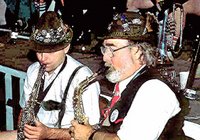The following editorial, published today in the Anchorage Daily News is a direct response to a previous editorial opposing my bill published by the state commissioner of Alaska's Department of Health and Human Services.
I'm very concerned about cost and availability of good health care in Alaska. With that in mind, I've sponsored both a bill and an initiative to eliminate the monoplies created by so-called "Certificates of Need" mandated by the state administration.
-----------------------------------------------
Anchorage Daily News Compass Editorial Published: April 7, 2006
By REP. BOB LYNN
Want to open a health care business in Alaska? Under current law, you'll have to go hat-in-hand to the governor and his minions to beg for a "certificate of need." That's why I've sponsored House Bill 287 and co-sponsored an initiative to repeal Alaska certificate of need law.
If someone wants to open a hot dog stand, shoe store or a health care facility, it's none of the government's business. A competitive marketplace is as American as apple pie, whether for medical care or anything else. Competition encourages lower prices, motivates excellence and facilitates consumer choice. That's Economics 101.
Current certificate of need requirements discriminate against small businesses by denying entry into the health care market. Limited choices inflate prices. Perhaps the Certificate of need should be relabeled "Certificate of Monopoly."
When I get sick, I don't want the government limiting my choices. The more medical availability the better. When I shop for a new TV, things usually turn out better if I have a wide range of dealers and models to choose from. Good medical care is no different and is infinitely more important.
Medical costs in Alaska are skyrocketing to crisis levels. Eliminating certificate of need requirements should help lower Alaska's health care costs, reduce workers' compensation costs and help keep things more affordable for both families and businesses. We can't lower the price of gasoline by limiting oil production. Why would limiting the supply of medical facilities lower health care costs?
As expected, health care monopolies with vested interests have responded the only way they can -- by attaching humongous fiscal notes to both my bill and the initiative. To paraphrase Ronald Reagan, "There they go again!"
The first cost scenario received for the initiative eliminating the certificate of need was an amazing $41 million. Fiscal notes by the Department of Health and Social Services for HB 287 came up to about $45 million cost to the state. A recent newspaper opinion piece by the administration pegs state fiscal impact at more than $30 million. Trying to get realistic estimates from the administration has been like trying to pick up a bar of soap in the shower.
The astronomical figures attached to HB 287 are grossly misleading and inaccurate. Estimates are based on extremely unlikely expenditures, like the cost of a new cardiac hospital. (That's as likely as Lockheed building an aircraft factory here.) Most expenditures cited in the administration estimates are paid for by the business owners at no cost to the state; nonetheless they're lumped into the fiscal note.
No explanation accompanies the data -- just numbers changing with each phase of the moon. The state admits the cost estimates are suspect by stating, "It is not possible to identify with any confidence which projects would or would not have been approved." Fiscal notes don't even mention potential savings to the state if the certificate of need requirement is scrapped.
The goal of HB 287 and the related initiative is to eliminate obsolete and artificial certificate of need barriers, thereby allowing expanded medical choice and less expensive health care. My bill and the initiative should be judged on verifiable fiscal information, potential cost savings and excellence for all concerned. That's only fair. Like everything else, medical care should be based on the principles of free enterprise -- not political influence from large monopolistic hospitals.
--------------------------
Note: My bill (HB287)is scheduled for its second hearing in the House HESS Committee on ASpril 27, 2006. Comments are invited.


